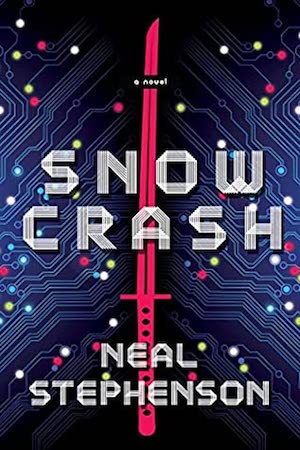
Neal Stephenson’s science fiction novel Snow Crash predicted the Metaverse in 1992. This cult guide has the amusingly-named Hiro Protagonist operating round in a man-made cyber world, attempting to cease a virus that wipes minds, aided by his hacker good friend Y.T. Actuality is a spot to flee from, a neoliberal future wrecked by hyperinflation and inequality and run by firms and gangsters and insane forms.
In some ways, the guide is horribly prescient. (It’s additionally horribly written in locations, extra like an data dump than a novel.) The Metaverse was a spot the place folks had digital avatars, the place they frolicked with pals, went buying and attended concert events. It was filled with advertisements, the infrastructure was owned by a billionaire, and a virus was wreaking havoc on society. All of it sounds acquainted.
It wasn’t COVID-19 in fact. The Snow Crash virus triggered the contaminated to lose the power to suppose for themselves, and so they begin talking in tongues.
“Clearly, on the time, we didn’t have social media,” Stephenson advised The Washington Put up, however added, “I used to be writing about only a long-standing human trait, which is that this tendency for the thoughts to get hijacked by concepts.”
The metaverse can’t enslave you, but, however the addictive nature of social media suggests it’s attainable you would possibly get hooked on a greater digital world, the place your hotter-looking avatar interacts with folks from everywhere in the planet and has adventures that aren’t attainable in actuality.

To provide you one loopy instance of the probabilities, there may be an precise theater firm within the zombie-infested on-line wasteland survival sport Fallout 76 that places on Shakespeare performs. So, you might be a part of the viewers, and even audition and act, in case you need. Nearly regular, besides you might have to blast a number of zombies in the course of Romeo and Juliet. The ushers patrol the perimeter with chainsaws and AK-47s to annihilate any undead critics looking for to make their analytical discourse upon the efficiency.
That is all very Snow Crash. There’s a actual pressure between using digital worlds for escape or leisure and the impetus for profiteering. Many firms see the metaverse and metaverse platforms as new continents to be colonized and exploited. If the metaverse develops beneath a centralized mannequin, then it will likely be Amazon, Fb and Google over again: whale time. A decentralized metaverse constructed round blockchain expertise could be extra egalitarian and put the facility again within the fingers of customers.
Enter the metaverse, stage left

Dr. Christina Yan Zhang, nicknamed “Dr. Metaverse,” wrote her 2012 thesis about MMORPGs and the early metaverse platform Second Life, so she’s been serious about this longer than most. She’s now the CEO of the Metaverse Institute.
“I feel the wonder concerning the present growth of the metaverse is principally the convergence of a complete vary of various applied sciences coming collectively. A lot of them are getting extra superior to essentially assist to create the following technology of web, which is extra immersive, interactive and intuitive.”
She sees the metaverse as an enabling expertise to enhance interplay in each actual and digital worlds.
Gaming author Wagner James Au has simply completed a guide that will likely be printed in June titled Making a Metaverse That Issues. Again within the early 2000s, he was the “digital journalist named Hamlet” in Second Life. His white-suited avatar (a nod to Tom Wolfe) went round submitting dispatches from that digital world.
He envisions there being a number of metaverses: “It’s going to be primarily based on the group; it’s going to be primarily based on tradition and aesthetics. For instance, Roblox is large, however it’s primarily with youngsters. And the aesthetics are very deliberately wanting like Legos. You could possibly bounce from Roblox to Fortnite, then Fortnite to VR chat. So, it is not going to be a single, digital world.”

He continues, “I outline it very instantly from what Snow Crash described: It was an enormous digital world with consumer creation instruments and extremely customizable avatars that’s built-in with the actual world economic system.”
“In different phrases, you may make cash from it and likewise combine with exterior expertise so you’ll be able to really hook it as much as different expertise past the immersive 3D expertise.”
Learn additionally
Snow Crash and capitalist realism
Science fiction and fantasy are identified for creating new worlds to expertise by way of literature, artwork and cinema. These genres have roots within the pervasive zeitgeist of their time, to allow them to typically find yourself being unimaginative about new political or social alternatives. Tragic, influential British tradition theorist Mark Fisher (who dedicated suicide in 2017) outlined this as “capitalist realism,” the notion that capitalism is the one political construction and even visionary literature can not often rise above imagining variations on this.

Snow Crash posits a dystopian actual world that makes escape into an alternate fantasy extra enticing: Hiro is a pizza supply boy in actual life; within the Metaverse, he’s the best swordsman alive.
The best tragedy could be if the specter of “capitalist realism” made the metaverse a mirror of the prevailing world. A digital world the place we peddle digital crap to one another to maintain our “likes” or crypto coming in. Roblox is a traditional instance: Its enterprise mannequin includes youngsters creating stuff with different youngsters that gives an earnings stream from their creativity. Web1 promised liberation however didn’t fulfill it. Web3 wants decentralization in order that firms don’t overwhelm it as they’ve with earlier iterations of the web.
The metaverse is just not with out its challenges. Journal’s Jillian Godsil appears to be like at some points here. Creator and futurist Bernard Marr additionally highlights some severe drawbacks.
Seven large issues

Creator and futurist Bernard Marr says, “I’m super-excited about this expertise,” however that comes with a warning concerning the potential perils of the metaverse. He has recognized seven main issues and downsides highlighting the downsides to the digital worlds. Most are fairly knotty challenges, which gained’t be straightforward to unravel in a malleable, consistently evolving world open to deviant conduct.
Privateness points
“We have already got privateness issues after we browse the online,” Marr says. “The expertise that’s already monitoring our conduct on-line may even exist within the metaverse, and the monitoring is prone to develop into much more invasive and intense.”
Wearable, haptic units may measure all types of bodily results comparable to coronary heart price and sweating. “Monumental quantities of information might be collected and utilized by firms for advertising and marketing or different functions,” Marr continues.
Security of kids
“As dad and mom, it’s already tough to trace what our children are doing on-line, and that problem will proceed with the metaverse. Understanding what our children are doing within the metaverse will likely be much more difficult as a result of we are able to’t see the world they’re of their VR headset, and there’s no course of in place for monitoring their screens utilizing tablets or telephones,” Marr opines.
Well being issues
The results of spending your total life within the metaverse may lead to everybody wanting just like the Axios People in Wall-E. “VR hangovers” are additionally a factor: The unhappiness and angst that come from leaving a really intense, absorbing expertise and returning to actuality can create a comedown just like medication or consuming. Gaming or web dependancy is already impacting psychological and bodily well being, so it may doubtlessly be even worse within the metaverse.

Entry inequality
Bernard Marr says, “With the intention to use augmented actuality, we’d like the newest smartphone and handset expertise, and VR experiences require high-tech, costly headsets in addition to sturdy and dependable connectivity,” he says.
“How can we ensure that everybody on the planet has equal entry to the metaverse, and never simply the individuals who have probably the most cash and dwell in developed nations?” This situation issues Zhang, too. She sees Starlink as a approach ahead: “The explanation I discussed Starlink is as a result of one-third of the worldwide inhabitants are nonetheless affected by the digital divide, so they don’t have entry to the web. These smaller Starlink satellites can cowl probably the most distant areas on the planet.”
Legal guidelines and laws
A major downside with all new expertise is how slowly legislators and regulators are to formulate acceptable authorized responses to the challenges offered. With one thing that’s immersive, international and anarchic, which incorporates cryptocurrencies in addition to the metaverse, authorities have difficulties maintaining with these technological adjustments.
Desensitization
Marr additionally worries that much more lifelike violence will desensitize folks to real-life violence. Though the zombie-hunting beginner thespians of Fallout 76 appear fairly balanced when Journal chats with them. The counterargument is perhaps that therapeutically killing orcs and zombies or catapulting indignant birds is a aid valve for real-world stresses. These should not unique points for the metaverse in fact and have been leveled at video games for years.
Identification hacking
In case your avatar is hacked, a malicious entity may unfold injury or presumably steal from you. That is one more use case for blockchain expertise within the metaverse as NFTs or blockchain-based id expertise is an answer prompt by Marr. So, your avatar might be anybody, however to enter the world, you would need to produce a digital, verified id. That’s just like KYC processes to join most crypto exchanges.
Subscribe
Essentially the most participating reads in blockchain. Delivered as soon as a
week.

Interoperability
Au believes that there will likely be many various metaverse platforms, catering to completely different audiences. Wang disagrees, believing that interoperability will likely be an essential approach to make sure that customers can transfer between experiences within the metaverse, through agreed protocols of “interoperability, standardization of the metaverse and all further property by organizations worldwide.” Interoperability and one unified Metaverse have been the imaginative and prescient in Snow Crash.
There’s additionally disagreement over the extent of immersion. Wagner thinks that there’s ample computing obtainable for most individuals to have a fairly immersive expertise through their smartphones, without having VR headsets. Zhang disagrees, feeling that a big enhance in computing energy and doubtless quantum computing will likely be wanted to completely understand an immersive VR system with thousands and thousands of customers.
The place is the metaverse heading?
On this tough time within the crypto universe, many metaverse tasks appear to be reorientating themselves. Individuals are exploring ventures with an extended timescale to achieve fruition. Zhang thinks that it’ll take 10 years to achieve mass adoption. She views the European Union’s provisional settlement on the Markets in Crypto-Belongings (MiCA) proposal – which goals to safeguard investing whereas fostering innovation – as an essential step ahead for regulating the sector.
Wagner sees the drivers of the metaverse as customers at each ends of the age spectrum: youngsters as a result of they may discover worth within the play house, and seniors, pushed by incapacity or social isolation, however capable of work together through their avatars in ways in which wouldn’t be really easy in the actual world. Wagner quotes the instance of an 86-year-old blues guitarist he met busking on the street in Second Life.
Curiously, Snow Crash’s Stephenson has now launched a metaverse startup known as Lamina1.
Wagner says, “Neal Stephenson launched it with a serious participant within the Bitcoin trade, Peter Vessenes. They’re making what they name a metaverse-as-a-service — so, a approach for creators to monetize their content material throughout numerous, a number of metaverse platforms.”
Vessenes, a Bitcoin pioneer, known as it “the bottom layer for the open metaverse: a spot to construct one thing a bit nearer to Neal’s imaginative and prescient — one which privileges creators, technical and creative, one that gives assist, spatial computing tech, and a group to assist those that are constructing out the metaverse.”
Lamina1 may be very a lot constructed across the interoperability imaginative and prescient: that there must be one internet-like platform the place gamers large and small can mutually coexist and flourish. That mentioned, Web1 and Web2 arguably didn’t attain that purpose, so it isn’t sure {that a} future model gained’t get dominated by large gamers as the online is now.
The metaverse is one other new expertise that has monumental potential for each monetary and social rewards. It additionally has vital negatives that might stifle its progress. However Zhang opts for the glass-half-full viewpoint:
“Essentially, we wish to use expertise to essentially profit extra folks to have a extra numerous, equal and sustainable world. We don’t need the expertise to be for a number of individuals who have privilege or they’re fortunate to be financially free. So, I feel there must be a very coordinated motion by governments, traders, NGOs and people coming collectively to make sure the remainder of one-third of the inhabitants, in nations the place the fundamental infrastructure is just not in place, might be given extra alternative to flourish — so nobody is left behind. That must be addressed on a a lot larger stage internationally.”
“See, the world is stuffed with issues extra highly effective than us. But when you understand how to catch a experience, you’ll be able to go locations.”
― Neal Stephenson, Snow Crash
Learn additionally

Julian Jackson
Julian is an expert journalist and copywriter, specializing within the setting, expertise and enterprise. He has labored for the BBC, Channel 4, Reader’s Digest, NBC and Der Spiegel. https://julianj.journoportfolio.com
